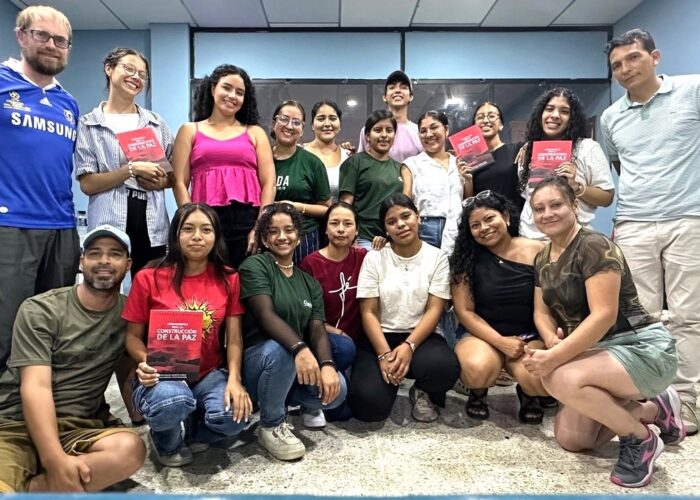NEWTON, Kansas (Mennonite Mission Network) — The wind of the Holy Spirit is carrying Mennonite Mission Network into uncharted waters and forging more nimble, integrative and mutual mission partnerships in a changing church and culture, agency leaders said in recent interviews.
The most urgent challenge in the realignment is to keep Christ at the center and as the anchor of Mission Network’s transformation, said Mike Sherrill, executive director and CEO of Mission Network, the mission agency for Mennonite Church USA (MC USA).
"As we work at transformation and strategic planning, in some ways, it feels like Jesus is asking us to step out onto uncharted waters," Sherrill said. "Like Peter, in Matthew 14, we are challenged to say, ‘Lord, if it is really you, then command us to meet you on the water.’ We take this step of faith, knowing that just as Jesus reached out for Peter, God is reaching out to the church and will hold us up. The challenge is for us to respond to God’s initiative."

The realignment is a fulfillment of what has been unfolding over the past two decades, rather than a criticism of former efforts, said Wil LaVeist, senior executive for the agency’s Advancement division and joint chief communication officer for Mission Network and MC USA. LaVeist said he believes that Sherrill, like Stanley W. Green before him, is positioning Mission Network to respond to the realities of an ever-evolving world.
"Oftentimes, we feel that making changes means that something was wrong or broken," he said. "But that is not the case. What it does mean is that outside forces of the very world we are called to serve are changing. So that is causing us to do strategic planning to continue being relevant for the future."

Two other senior executives are joining Sherrill and LaVeist on the Executive Leadership Team that is guiding the voyage into seas of change. They are Martin Gunawan, Operations; and Marisa Smucker, Ventures. Together, they are shaping their divisions to address Mission Network’s realignment goals:
- Extending capacity to serve global partners, as well as MC USA conferences and their congregations.
- Revitalizing the agency’s commitment to BIPOC (Black, Indigenous and People of Color) communities.
- Growing capacity for discipleship training and church planting bilingually, with global networking.
- Dismantling racism throughout the agency.
- Pivoting and innovating for an increasingly digital culture.
- Forging deeper cross-functional teams and more fluid interdepartmental communication.

"The consolidation happening in Ventures is creating new opportunities for synergy and collaboration to happen, both internally and externally," said Smucker. She was appointed to her role in late August, after having served as a Church Relations associate and the former director of the agency’s Mennonite Voluntary Service (MVS). The new division is weaving together three major strands of the agency’s work. They are:
Constituent engagement involves relationship-building with area conferences and congregations, schools, agencies, etc. This will include networking with constituents and connecting them with the agency’s partners and resources in other parts of Mission Network.
Global partnerships entails walking together in mission with regions around the world: Africa, Asia, Europe, Latin America, Middle East and North America, and includes Christian Service programs.
Training and resourcing is an offshoot of the current Church Relations work that has now become a new department. It is providing resources for MC USA congregations and beyond, including peace church planting and Anabaptist discipleship.
Operations is also consolidating several former functions of the agency — finance, human resources and information technology (IT), said Gunawan, who joined the agency Sept. 20. Formerly, the agency had a Finance division and a Human Resources division, with IT working separately from both.
"This [new] division is responsible for keeping day-to-day operations running smoothly and efficiently, as a strong support for the other divisions," Gunawan said. "This consolidation is the moving of these functions out of their silos, so they can work at the same vision simultaneously."

Preparing for voyage, and casting off
The leaders believe that the short-term stress and casting off of extra weight will streamline the agency’s ability to function. Though some of the details of the proposed changes have not yet been implemented, place, leaders remain buoyant in their trust of God’s faithfulness.
"We don’t have to make these changes, as the agency has already been joining God in mission," Gunawan said. "But we want to make these changes to better move into the future with God."
As an example, Smucker said, Mission Network wants to respond to the changing composition of MC USA area conferences, by inviting groups to the table who haven’t been there before.
"Conferences have larger groups of Indonesian, Chin and African churches in the United States," Smucker said. "The global is coming to the local. … We need to be transformed as a church. God is not asking us to throw away the past but to make changes, so we can move into a new place with the foundation of the old and the innovations of the new."
Glen Guyton, executive director of MC USA, said he appreciates how the church’s leaders are looking at new and creative ways of engaging the church.
"I am hopeful that this realignment will allow Mission Network to better live into its role as the mission agency of MC USA," Guyton said. "Mike [Sherrill] is very passionate, and that type of energy gives us all hope for the future."
Andrew Bodden, chair of the board of directors for Mission Network, said realignment does not mean past ways of working were wrong. Rather, the agency is refocusing for future relevancy.
"We are looking with new lenses into the future," Bodden said. "We are hoping to generate new opportunities and destinations where
we can land, connect, relate, and create new ways to continue being the gospel."
Sherrill referenced 2 Timothy 1:7 as the source of empowerment through God’s spirit to be the gospel in fresh ways.
"This truth empowers us, even in pandemic uncertainties, to continue boldly planning for our service programs, to continue recruiting international workers, and to continue expanding our capacity to equip and empower the church, so that people of all cultures may be transformed by Jesus Christ," he said.





